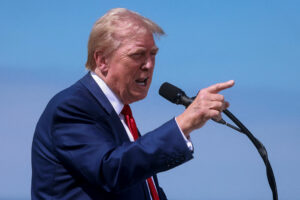By Justine Irish D. Tabile, Reporter
THE Philippine Exporters Confederation, Inc. (Philexport) said its members need to diversify their markets in the face of the unpredictability of US trade policy.
“The problem is, knowing Trump, the situation is still fluid. He might change his mind on some aspects,” Philexport President Sergio Ortiz-Luis, Jr. told reporters.
“There are items now that are exempted… Those are things that he might change his mind on,” he added.
US President Donald J. Trump last week announced a 90-day pause on the duties he had unveiled on April 2. The April 2 tariff schedule featured some of the highest rates being imposed on members of the Association of Southeast Asian Nations (ASEAN).
Cambodia is facing a 49% tariff, followed by Laos (48%), Vietnam (46%), Myanmar (44%), Thailand (36%), Indonesia (32%), Malaysia (24%), and Brunei (24%).
The Philippines was assigned a 17% tariff, second in the region only to Singapore’s baseline rate of 10%.
With the 90-day pause now in place, all countries will be charged the blanket 10% duty until July, pending negotiations in Washington with various national delegations.
Following a virtual meeting on Thursday, ASEAN ministers committed to not imposing retaliatory measures in response to the US tariffs.
Mr. Ortiz-Luis said for the moment, the Philippines is in a good position, but “we have to watch for the changes that will happen because some are negotiating, some are retaliating, so I think we should just keep quiet and watch.”
In particular, Vietnam expressed openness to bringing down its tariffs on US goods to zero.
Asked if this is something the Philippines should do, Mr. Ortiz-Luis said that the Philippines is relatively a small market for the US.
“We are not such a big exporter to the US … We are not a big player to be able to affect the US,” he said.
Instead of helping exporters, he said that the zero rate on US goods will result in supply chain issues.
He said the Philippines needs to address its non-tariff barriers.
“Even with the lower tariff here, that may not be enough to counter the corruption issues and red tape, among others,” he said.
In its 2025 National Trade Estimate Report, the Office of the US Trade Representative identified bribery and corruption as among the barriers to trade in the Philippines.
“Corruption is a pervasive and longstanding problem in the Philippines. National and local government agencies, particularly the Bureau of Customs, are beset with various corruption issues,” according to the report.
“Both foreign and domestic investors have expressed concerns about the lack of transparency in judicial and regulatory processes,” it added.
Asked which markets the Philippines should focus on, he said, “China. Before, China was catching up to the US as our export market.”
“If you combine Greater China, they are more than double the US and Japan. So it is important that we continue with developing other markets,” he added.

